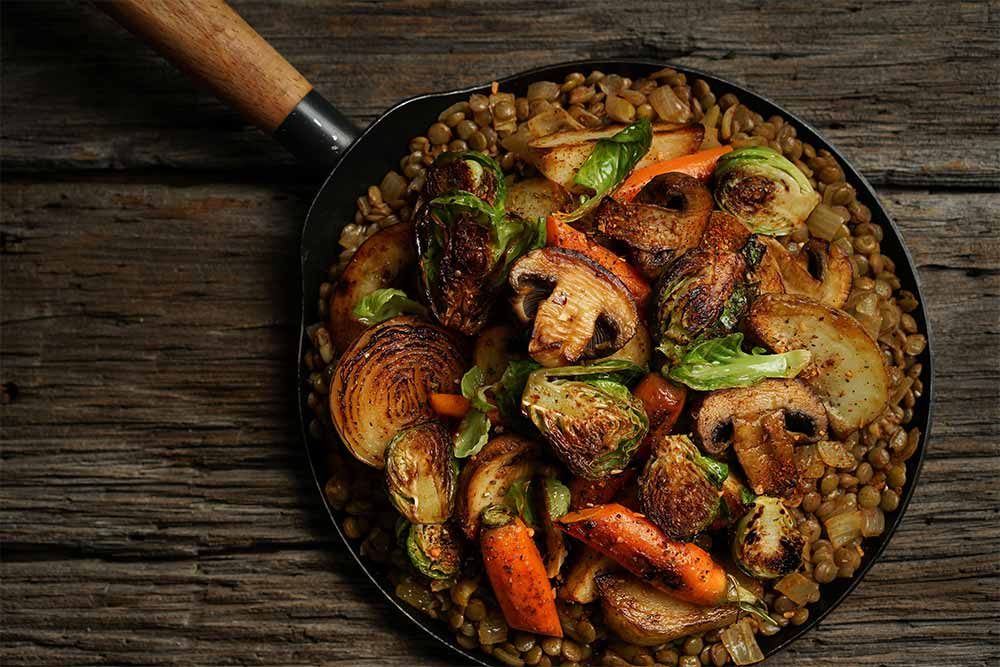

In the US, roughly 40% of the adult population currently qualifies as “obese” (1), and a large percentage of people are unhappy with the way their bodies look (2). Not surprisingly, the weight loss industry here is now a $72 billion market (3), in large part because the foods most commonly advertised and consumed work directly against the bodies we have been told (also by advertisers) we should have.
While there’s clearly no “ideal” body type, since people come in all different shapes and sizes, those who want to reduce their body fat for health, performance, or aesthetic purposes face a significant challenge if they eat a standard animal-based diet (4-8).
High in calories and low in fiber and healthy carbohydrates, diets centered around meat, dairy, eggs and processed foods make it virtually impossible to satiate hunger without leading to a steady (or rapid) increase in body fat (9). As a result, many people who want to lose weight yo-yo between their usual diet of hamburgers, french fries, soda, ice cream, etc., and fad diets that limit calories, often by restricting carbohydrates, the “enemy” of dieters everywhere (10).
Making matters worse, people also believe that a lot of exercise is required to lose body fat, despite the fact that research has shown that exercise, while healthy, has only a modest effect on weight loss (11). Stuck on a treadmill with nothing to look forward to but a dinner of plain chicken breast and steamed broccoli, dieters spend their days hungry, deprived, fatigued, and perfectly set up for failure — since it’s only a matter of time before their natural cravings for taste, fullness, and energy take over and they revert back to their old way of eating.
Plant-based diets — especially ones centered around unrefined foods like fruits, vegetables, whole grains, legumes, as well as some nuts and seeds — offer a healthy, fulfilling, and long-term solution to this torturous and self-defeating yo-yo effect. They accomplish this in a number of ways, including lower caloric density, a leaner protein package, healthy carbohydrates, increased thermogenesis, and improved hormone levels.

Lower Caloric Density
Caloric density is a term used to measure the number of calories per pound of food. Since most people eat about 5.5 pounds of food per day (12), choosing foods that contain fewer calories per pound is an effective starting point for leaning out (9,13,14).
Animal foods like meat or cheese contain several times more calories per pound than most unrefined plant foods, like fruit or oatmeal. Most plant foods are less calorically dense because they typically come packed with fiber and water, which take up more total volume while providing fewer total calories. They also tend to contain less fat, which yields more than double the calories per gram than carbohydrates or protein (9,15).
As a result, eating plant-based foods (excluding processed foods like cookies and potato chips) tend to make us feel fuller sooner, activating our stomach’s stretch receptors and telling us to slow down before we have a chance to overeat (16). Supporting this, research has shown that adding more lower calories foods (like fruits and vegetables) to your diet is more effective than simply limiting higher calorie foods (like hamburgers and ice cream) (17).
This helps explain why people who switch to a plant-based diet, even when it includes some processed foods like those mentioned above, decrease their body fat stores (18).
Leaner Protein Package
While most people think that eating more protein is central to fat loss, it’s the source of protein that actually makes the biggest difference.
As discussed above, typical sources of animal protein like meat and dairy products have more calories per pound than typical plant sources (9). This helps explain why red meat and poultry are linked to weight gain (19), while beans, lentils, and chickpeas are not (20). It also helps explain why people who replace sources of animal protein with sources of plant protein experience a reduction in body fat (18).
In one notable experiment, people who switched from a standard animal-based diet to a largely unprocessed plant-based diet dropped nearly 10 pounds of pure fat in four months, despite being allowed to eat as much food as they wanted. The researchers estimated that switching the source of protein (from animal to plant) was responsible for at least half of the total fat loss (21).
But What About Carbs?
In this same experiment, carbohydrate intake was also linked to fat loss, with each 10% increase in calories from carbohydrates associated with 2.7 pounds of body fat loss (22).

This would likely surprise most people, who have been conditioned to believe that carbohydrates as a whole are the root cause of excess body fat, and that a “low-carb” diet is the key to weight loss. But the reality is that while refined carbohydrates like sugar and white flour — which have been stripped of fiber and other key nutrients — are associated with weight gain (23), the opposite is true for unrefined carbohydrates like oats, bananas and sweet potatoes — with their fiber and key nutrients left intact — which are consistently associated with decreased body fat (24,25).
This provides yet another reason for why people who eat plant-based diets, despite getting more of their calories from carbohydrates than those on animal-based diets, continue to display lower levels of body fat (4-8).
While more fiber, higher water content, less fat, and yes, more carbohydrates (in their unrefined form), constitute the primary reasons why a plant-centered diet is the healthiest and most sustainable option for creating and maintaining a lower body fat percentage, there are a few other notable mechanisms that can augment this effect.
Increased thermogenesis, the process of creating body heat, is one of them. If the thermic effect of a meal is low, calories will more readily be turned into body fat. If the thermic effect is high, these calories are more likely to be burned off as body heat (26). Compared to animal-based diets, plant-based diets have been shown to increase calories burned as body heat by 16% (27).
Improved hormone levels is another reason. Cortisol is a stress hormone that decreases muscle mass and increases body fat (28). Simply replacing animal foods with plant foods high in carbohydrates can result in a 27% reduction in cortisol levels (29). People eating plant-based diets have also been shown to have lower insulin levels (despite consuming more carbohydrates) and less abdominal fat (6,7).
While many people who want to reduce body fat spend years, if not decades, yo-yoing between their standard, weight-inducing animal-based diet and calorie-restricted diets that leave them hungry, tired, and set up for failure, plant-based eating centered around whole foods offer the healthiest and most sustainable solution for getting and staying lean.
Page References
(1) Hales CM, Carroll MD, Fryar CD, Ogden CL. Prevalence of obesity among adults and youth: United States, 2015–2016. NCHS Data Brief. 2017 Oct;288:1-8.
(2) Fallon EA, Harris BS, Johnson P. Prevalence of body dissatisfaction among a United States adult sample. Eat Behav. 2014 Jan;15(1):151-8.
(3) Marketdata LLC. The U.S. Weight Loss & Diet Control Market. 2019 Feb;4753379:1-457.
(4) Kim MK, Cho SW, Park YK. Long-term vegetarians have low oxidative stress, body fat, and cholesterol levels. Nutr Res Pract. 2012 Apr;6(2):155-61.
(5) Acosta-Navarro JC, Oki MA, Gomes de Gouveia LA, Hong V, Bonfim MC, Acosta-Cardenas P, Picolo LR, Nólibos J, Moraes G, Zeferini E, Lopes H, Miname M, Bortolotto LA, Filho WS, Santos RD. Healthier body composition in vegetarian men compared to omnivorous men. J Nutr Food Sci. 2016 Jul, 6(4).
(6) Cui X, Wang B, Wu Y, et al. Vegetarians have a lower fasting insulin level and higher insulin sensitivity than matched omnivores: A cross-sectional study. Nutr Metab Cardiovasc Dis. 2019 May;29(5):467-73.
(7) Alexander H, Lockwood LP, Harris MA, Melby CL. Risk factors for cardiovascular disease and diabetes in two groups of Hispanic Americans with differing dietary habits. J Am Coll Nutr. 1999 Apr;18(2):127-36.
(8) Benatar JR, Stewart RAH. Cardiometabolic risk factors in vegans; A meta-analysis of observational studies. PLoS ONE. 2018 Dec;13(12):e0209086.
(9) Rolls BJ. Dietary energy density: Applying behavioural science to weight management. Nutr Bull. 2017 Sep;42(3):246-53.
(10) Montani JP, Schutz Y, Dulloo AG. Dieting and weight cycling as risk factors for cardiometabolic diseases: who is really at risk? Obes Rev. 2015 Feb;16 Suppl 1:7-18.
(11) Swift DL, Johannsen NM, Lavie CJ, Earnest CP, Church TS. The role of exercise and physical activity in weight loss and maintenance. Prog Cardiovasc Dis. 2014 Jan-Feb;56(4):441-7.
(12) Aubrey A. The Average American Ate (Literally) A Ton This Year. NPR. 2011 Dec. (13) Romaguera D, Ängquist L, Du H, Jakobsen MU, Forouhi NG, Halkjær J, Feskens EJM, van der A DL, Masala G, Steffen A, Palli D, Wareham NJ, Overvad K, Tjønneland A, Boeing H, Ribali E, Sørensen TIA. Dietary determinants of changes in waist circumference adjusted for body mass index – a proxy measure of visceral adiposity. PLoS ONE. 2010 Jul;5(7):e11588.
(14) Ello-Martin JA, Roe LS, Ledikwe JH, Beach AM, Rolls BJ. Dietary energy density in the treatment of obesity: a year-long trial comparing 2 weight-loss diets. Am J Clin Nutr. 2007 Jun;85(6):1465-77.
(15) Wright N, Wilson L, Smith M, Duncan B, McHugh P. The BROAD study: A randomised controlled trial using a whole food plant-based diet in the community for obesity, ischaemic heart disease or diabetes. Nutr Diabetes. 2017 Mar;7(3):e256.
(16) Holt SH, Miller JC, Petocz P, Farmakalidis E. A satiety index of common foods. Eur J Clin Nutr. 1995 Sep;49(9):675-90.
(17) Vadiveloo M, Parker H, Raynor H. Increasing low-energy-dense foods and decreasing high-energy-dense foods differently influence weight loss trial outcomes. Int J (Lond). 2018 Mar;42(3):479-86.
(18) Phillips F, Hackett AF, Stratton G, Billington D. Effect of changing to a self-selected vegetarian diet on anthropometric measurements in UK adults. J Hum Nutr Diet. 2004 Jun;17(3):249-55.
(19) Halkjær J, Olsen A, Overvad K, Jakobsen MU, Boeing H, Buijsse B, Palli D, Tognon G, Du H, van der A DL, Forouhi NG, Wareham NJ, Feskens EJ, Sørensen TI, Tjønneland A. Intake of total, animal and plant protein and subsequent changes in weight or waist circumference in European men and women: the Diogenes project. Int J Obes (Lond). 2011 Aug;35(8):1104-13.
(20) Kim SJ, de Souza RJ, Choo VL, Ha V, Cozma AI, Chiavaroli L, Mirrahimi A, Blanco Mejia S, Di Buono M, Bernstein AM, Leiter LA, Kris-Etherton PM, Vuksan V, Beyene J, Kendall CW, Jenkins DJ, Sievenpiper JL. Effects of dietary pulse consumption on body weight: a systematic review and meta-analysis of randomized controlled trials. Am J Clin Nutr. 2016 May;103(5):1213-23.
(21) Kahleova H, Fleeman R, Hlozkova A, Holubkov R, Barnard ND. A plant-based diet in overweight individuals in a 16-week randomized clinical trial: metabolic benefits of plant protein. Nutr Diabetes. 2018 Nov;8(1):58.
(22) Kahleova H, Dort S, Holubkov R, Barnard ND. A plant-based high-carbohydrate, low-fat diet in overweight individuals in a 16-week randomized clinical trial: The role of carbohydrates. Nutrients. 2018 Sep;10(9). pii: E1302.
(23) Sartorius K, Sartorius B, Madiba TE, Stefan C. Does high-carbohydrate intake lead to increased risk of obesity? A systematic review and meta-analysis. BMJ Open. 2018 Feb;8(2):e018449.
(24) Williams PG, Grafenauer SJ, O’Shea JE. Cereal grains, legumes, and weight management: a comprehensive review of the scientific evidence. Nutr Rev. 2008 Apr;66(4):171-82.
(25) Schwingshackl L, Hoffmann G, Kalle-Uhlmann T, Arregui M, Buijsse B, Boeing H. Fruit and Vegetable Consumption and Changes in Anthropometric Variables in Adult Populations: A Systematic Review and Meta-Analysis of Prospective Cohort Studies. PLoS ONE. 2015 Oct;10(10):e0140846.
(26) Calcagno M, Kahleova H, Alwarith J, Burgess NN, Flores RA, Busta ML, Barnard ND. The thermic effect of food: A review. J Am Coll Nutr. 2019 Aug;38(6):547-51.
(27) Barnard ND, Scialli AR, Turner-McGrievy G, Lanou AJ, Glass J. The effects of a low-fat, plant-based dietary intervention on body weight, metabolism, and insulin sensitivity. Am J Med. 2005 Sep;118(9):991-7.
(28) Van Rossum EF, Lamberts SW. Polymorphisms in the glucocorticoid receptor gene and their associations with metabolic parameters and body composition. Recent Prog Horm Res. 2004 Jan;59:333-57.
(29) Anderson KE, Rosner W, Khan MS, et al. Diet-hormone interactions: protein/carbohydrate ratio alters reciprocally the plasma levels of testosterone and cortisol and their respective binding globulins in man. Life Sci. 1987 May;40(18):1761-8.
What about low fat dairy? Don’t carbs make you fat? Our experts and athletes weigh in on the most commonly asked questions about getting and staying lean.
View All